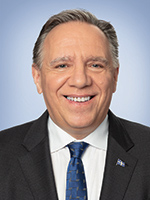Published on : 07/03/2025 at 18:04 ---
Hydro-Québec, the flagship energy company in Quebec, finds itself at the heart of a double controversy involving an increase in electricity prices and an increase in the salaries of its top executives. These developments raise questions about the equity and financial management of the public enterprise, especially as the Crown corporation has been making positive profits for two decades.
The Régie de l'énergie recently announced a 3.6% increase in Hydro-Québec’s residential rates effective April 1, 2025. This decision provoked a strong reaction from Prime Minister François Legault, who strongly opposed it.
"There is no question of that. As long as I am prime minister, residential rates will not increase by more than 3% per year."

The government is now considering legislative action to limit this increase.
This is in a complex context. In 2019, legislation was passed to index electricity rates to inflation, aiming for an average increase of 2% per year. However, the pandemic and high inflation disrupted this balance, forcing the government to cap increases at 3% in 2022. The rebalancing mechanism planned after five years led the Régie to impose a 3.6% increase this year.
At the same time, the compensation of Hydro-Québec’s senior executives increased by 8.9% in 2024, raising questions about pay equity within the company. For example, Michael Sabia, CEO, received close to $840,000 in 2024.
Hydro-Québec employees received an average salary increase of 3.5% in 2023. The company paid nearly $36.9 million in bonuses to its employees in 2023, 21% more than in 2022. Quebec consumers are facing significant rate increases, with residential rates rising by 3% and some businesses up to 5.1% since spring 2024.
The following is a table showing Hydro-Québec’s net profit from 2000 to 2024:
|
Year |
Net profit (million CAD) |
|
2000 |
1 000 |
|
2001 |
1 108 |
|
2002 |
1 526 |
|
2003 |
1 931 |
|
2004 |
1 664 |
|
2005 |
2 500 |
|
2006 |
3 600 |
|
2007 |
2 900 |
|
2008 |
3 141 |
|
2009 |
3 035 |
|
2010 |
2 515 |
|
2011 |
2 611 |
|
2012 |
2 700 |
|
2013 |
2 940 |
|
2014 |
3 380 |
|
2015 |
3 100 |
|
2016 |
2 800 |
|
2017 |
2 846 |
|
2018 |
3 192 |
|
2019 |
2 923 |
|
2020 |
2 303 |
|
2021 |
3 564 |
|
2022 |
2 600 |
|
2023 |
3 200 |
|
2024 |
2 663 |
However, it is important to note that Hydro-Québec has had positive profits for the past two decades. This situation raises questions about the need for continued tariff increases. Many observers believe that the government must take more decisive action to stop these repeated increases, arguing that the financial health of the company does not justify such increases.
The controversy surrounding Hydro-Québec highlights the challenges of balancing sound financial management, normal salaries for executives, and affordable rates for consumers. The Legault government faces a dilemma: keeping its promise to limit tariff increases while ensuring the economic viability of the Crown corporation. The next few weeks will be crucial to see how these issues are resolved, with a particular focus on the legislative intervention announced by the Prime Minister.
SHARE